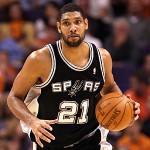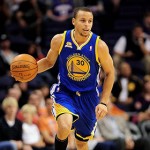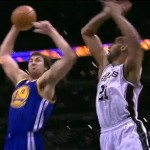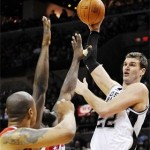 The San Antonio Spurs are in the second round of the playoffs. That’s pretty much the biggest non-story of the postseason, given that they’ve failed to move past the first round just three times in the Tim Duncan era.
The San Antonio Spurs are in the second round of the playoffs. That’s pretty much the biggest non-story of the postseason, given that they’ve failed to move past the first round just three times in the Tim Duncan era.
For the Golden State Warriors, it’s nearly uncharted territory – they’ve made it to the conference semifinals only twice in the last 22 years: once back in 2007, when they upset the Dallas Mavericks as an 8th seed, and once back in 1991, when they beat the Spurs in the first round. The last time Golden State went beyond the semifinals was back in 1975, when it won the only championship in its 41-year history.
Safe to say, history is not on the side of the Warriors.
It gets even worse when you consider the fact that the team has lost 29 consecutive games in San Antonio. To put it another way, the Spurs have never lost at home to the Warriors in the Duncan era. That’s pretty extreme, and it gives people an easy reason to say that the Spurs probably have this series in the bag. These facts, however, are mostly useless at this point, given how bad the Warriors have been over the last 15-plus years versus where they are now.
[Looking for Spurs tickets? Look no further.]
It’s clear that under a new regime and one of the most inspirational coaches we’ve seen in Mark Jackson, these are not the Warriors of the past. They’ve defied all odds from the beginning of the season right through Round One of the playoffs. No one outside of the Bay Area gave them much of a chance to make the playoffs, and no one really gave them a chance against the Denver Nuggets in the first round (except me). And yet, here they are. The question now is whether they can overcome, by far, their biggest challenge of the season: The mighty Spurs.
The Spurs made quick work of a depleted Los Angeles Lakers team in the first round, and didn’t have to worry about making a whole lot of adjustments. That should change against the Warriors, who saw the keys to their future – Stephen Curry and Andrew Bogut – rise to form a deadly combination of offense and defense.
George Karl was never really able to find a way to contain Curry. He also failed to figure out a way to guard the pick-and-roll, among other things. It’s now on Gregg Popovich, who is on another level in terms of strategic coaching in the postseason, to figure it all out. Luckily for him, he won’t have to rely heavily on Corey Brewer, who didn’t seem to understand the concept of staying with Curry at all times.
For the Warriors, they have the task of facing a team that is well-disciplined on both ends of the floor. No more playing against one of the worst teams at defending the 3-point line. No more wide-open looks at the basket every other play. No more easy transition baskets on terrible shot selection by the opposition. Defending becomes tougher as they face a more structured and better ball-moving team. One thing the Spurs don’t do is beat themselves. In order to beat them, the Warriors will have to outplay them.
The teams split the season series 2-2, but that certainly doesn’t tell the whole story. Check out the number of missed games from key players: Curry missed one, Bogut missed all but one, Tony Parker and Manu Ginobili each missed two and David Lee – who likely won’t be a serious contributor in the series – played in all of them. Popovich sat most of his starters in their final meeting, which means whatever happened in that game doesn’t really apply. Let’s take a look at the five key factors that will help determine this intriguing series:
1. The battle of the star point guards:
 At this point, there is no question that Curry has ascended into the category of superstardom after his jarring performance in the first round, where he averaged 24.3 points including 3.8 3-pointers, 4.3 rebounds, 9.3 assists and 2.2 steals. His ability to shoot from anywhere on the court while still being able to find the open man has caused headaches for opposing coaches all season long.
At this point, there is no question that Curry has ascended into the category of superstardom after his jarring performance in the first round, where he averaged 24.3 points including 3.8 3-pointers, 4.3 rebounds, 9.3 assists and 2.2 steals. His ability to shoot from anywhere on the court while still being able to find the open man has caused headaches for opposing coaches all season long.
The Spurs have a disciplined group of defenders that will surely be instructed to stick with Curry at all times, so he may not necessarily have the types of scoring opportunities he had against Denver. He should see a healthy dose of coverage from Parker, Danny Green and even Kawhi Leonard. Some combination of those players (along with Cory Joseph) helped limit Curry to 38 percent shooting in two regular-season games, but the sample size is just too small, and Parker only played once against him this season. The Warriors have a variety of screen plays (including the well-known “elevator” screen) that have freed up the sharp-shooter for looks at the basket, and how well he plays in pick-and-roll situations will be key in the series.
As mentioned, Parker only played in two games against the Warriors with split results: 25 points on 10-of-18 shooting and eight assists in a win; 18 points on 7-of-18 shooting and three assists in a loss. In the loss, he had trouble doing anything effective against the bigger Klay Thompson, who surprisingly bottled up the lighting-quick point guard. Parker will have to do his best to match Curry in production and quickly prove that Thompson isn’t going to slow him down at all.
2. The battle between Tim Duncan and Andrew Bogut:
 Duncan, by far, is the biggest hurdle standing in the Warriors path to the Western Conference Finals. Despite being 37 years of age, he averaged a robust 22.7 points, 12 rebounds and 3.7 blocks. Golden State has never had a defender truly worthy of being able to contain the Big Fundamental, but it has one now in Andrew Bogut. The Aussie, who averaged 10.3 rebounds and 2.3 blocks in the first round, singlehandedly negated the Denver Nuggets’ ability to attack the paint and was simply incredible on the defensive end. He will have to provide the same type of presence against the Spurs, but will have his hands full in trying to limit Duncan from taking over the series. If he can handle the single coverage on Duncan, it will prevent the Spurs from being able to dominate the inside-out game. Without another force in the paint due to Tiago Splitter’s cloudy status, the matchup between Duncan and Bogut could determine the overall effectiveness of the Spurs’ offense.
Duncan, by far, is the biggest hurdle standing in the Warriors path to the Western Conference Finals. Despite being 37 years of age, he averaged a robust 22.7 points, 12 rebounds and 3.7 blocks. Golden State has never had a defender truly worthy of being able to contain the Big Fundamental, but it has one now in Andrew Bogut. The Aussie, who averaged 10.3 rebounds and 2.3 blocks in the first round, singlehandedly negated the Denver Nuggets’ ability to attack the paint and was simply incredible on the defensive end. He will have to provide the same type of presence against the Spurs, but will have his hands full in trying to limit Duncan from taking over the series. If he can handle the single coverage on Duncan, it will prevent the Spurs from being able to dominate the inside-out game. Without another force in the paint due to Tiago Splitter’s cloudy status, the matchup between Duncan and Bogut could determine the overall effectiveness of the Spurs’ offense.
3. Injuries – And There Are Plenty of Them:
 As of Sunday, Tiago Splitter’s status for Game 1 was in doubt due to a sprained ankle suffered against the Los Angeles Lakers in the first round. This holds major implications on how the series will turn out, as the Spurs become a much smaller team in his absence. Without Splitter, who averaged 13.5 points and seven rebounds in four games against the Warriors in the regular season, Gregg Popovich will have to rely on Aron Baynes, Matt Bonner and DeJuan Blair – not exactly the most intimidating bunch – to fill in the minutes.
As of Sunday, Tiago Splitter’s status for Game 1 was in doubt due to a sprained ankle suffered against the Los Angeles Lakers in the first round. This holds major implications on how the series will turn out, as the Spurs become a much smaller team in his absence. Without Splitter, who averaged 13.5 points and seven rebounds in four games against the Warriors in the regular season, Gregg Popovich will have to rely on Aron Baynes, Matt Bonner and DeJuan Blair – not exactly the most intimidating bunch – to fill in the minutes.
Splitter is a major presence in the post and his size causes problems for the Warriors – especially if they elect to go small – but can he be effective on a bum ankle? We saw a shell of Kenneth Faried due to an ankle sprain in the first round, and could be looking at a similar scenario with Splitter. If he can’t be effective, the Spurs will be forced into playing small-ball with the Warriors, and that’s the last thing they want to do.
Boris Diaw has missed the past month after undergoing back procedure, but claims to be in good shape (when is he ever in good shape?). He will be ready to play to begin the series, and could play a vital role in helping the team with his playmaking ability.